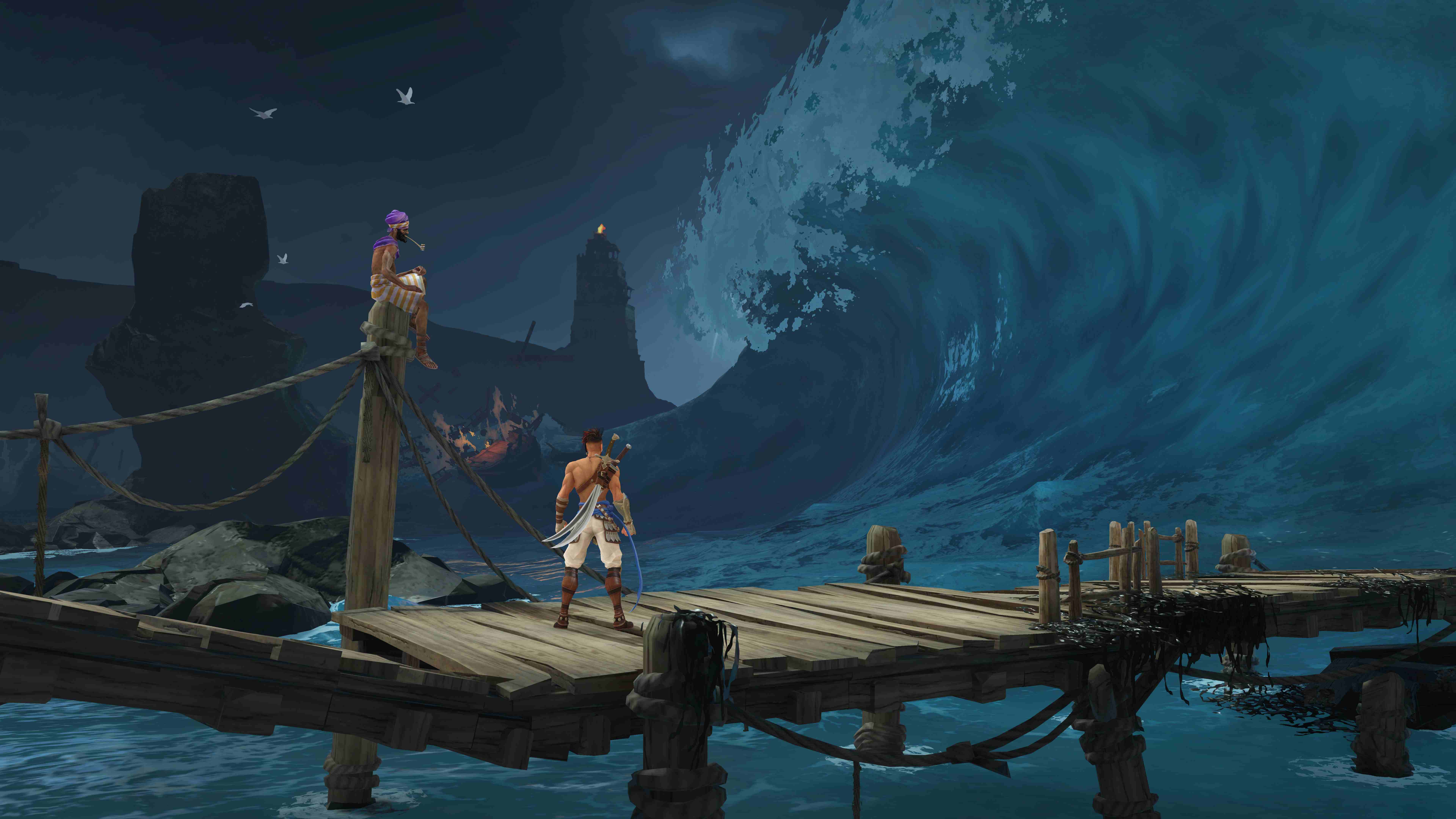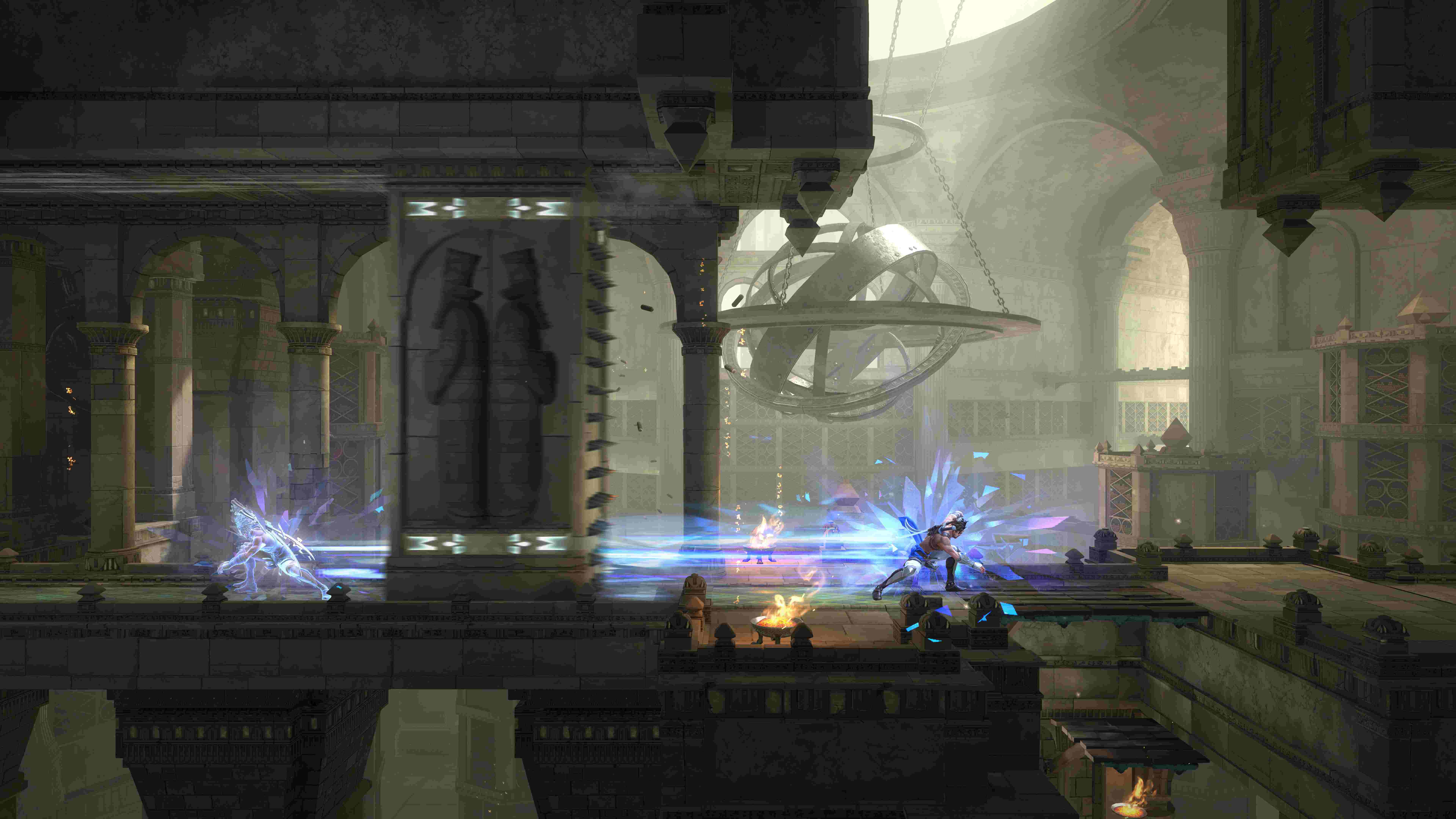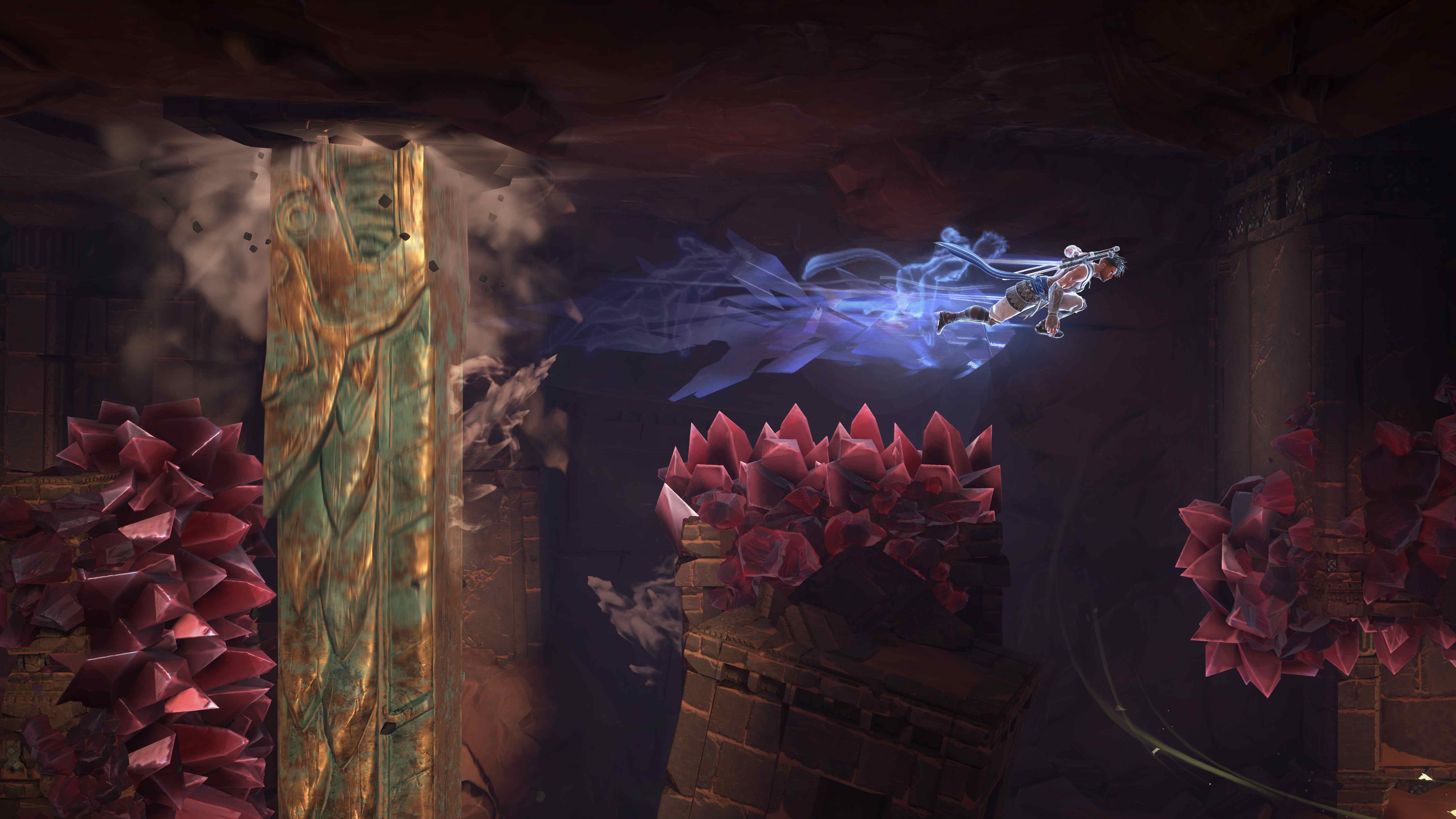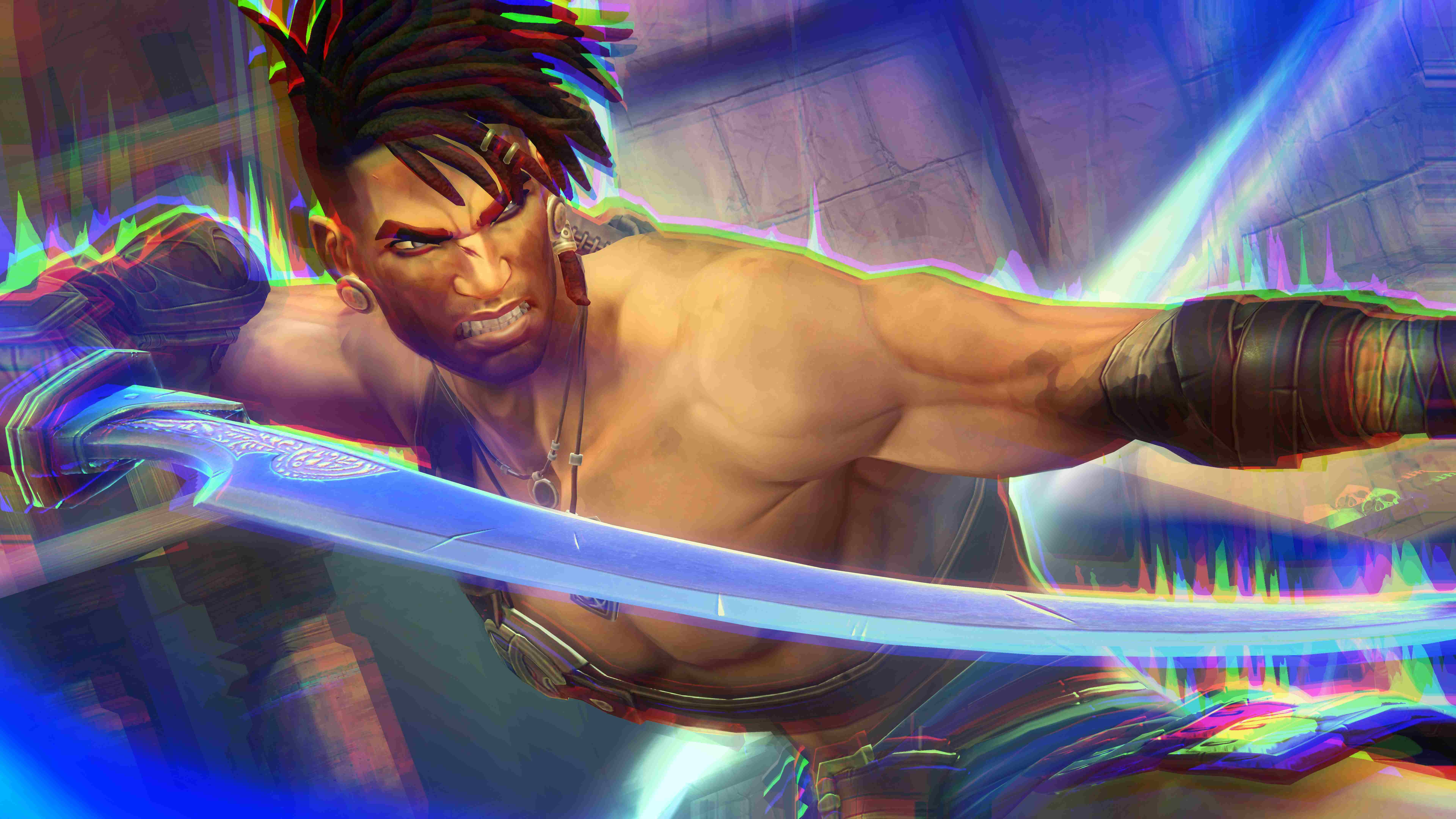
A lot of people grew up on the Prince of Persia series, but I was not one of them. I was vaguely aware of the franchise in my childhood, but I never actually played any of the games myself. So, color me surprised when I found myself paying attention to the reveal trailer for Prince of Persia: The Lost Crown. I saw a myriad of fans decrying the reveal for the stylized visuals and the lack of a proper third dimension, but what I saw was the potential for a brand-new, beautiful, massively satisfying Metroidvania platformer.
A little while ago, Ubisoft granted me the opportunity to go hands-on with Prince of Persia: The Lost Crown for more than three hours, played remotely from a Ubisoft-bound PC. I'm coming away from the preview genuinely excited for the full product and even a little interested in the Prince of Persia games that came before this one. Read on for my full thoughts on this upcoming title and why Ubisoft may have the next great Metroidvania on its hands.
Disclaimer: This preview was made possible by a preview session provided by Ubisoft. The company did not see the contents of this preview before publishing.
Breathing new life into the legendary Prince of Persia series
• Price: $49.99 at Amazon (pre-order)
• Release date: Jan. 18, 2024
• Developer: Ubisoft Montpellier
• Publisher: Ubisoft
• Genre: Action-adventure / platformer
• Players: Single-player
• Playtime: ~20 hours
• Platforms: Xbox, Windows PC, PlayStation, Switch
• Xbox Game Pass: No
All of the most recent mainline Prince of Persia games embraced 3D visuals as full-blown action-adventure games... But the last proper Prince of Persia title was released all the way back in 2010 with The Forgotten Sands. That's a long time for Prince of Persia fans to go without a brand-new game to play, hence the disappointment from some fans that The Lost Crown doesn't appear to be a direct continuation of the games that came before it.
For me, though, nostalgia doesn't apply. This is my opportunity to be introduced to the Prince of Persia franchise for the very first time, and I'm certain the Ubisoft team working on the game recognizes that's also true for many, many more people. Thus, The Lost Crown is a standalone story following a brand-new protagonist, Sargon, exploring a varied and detailed world with a wide variety of brand-new abilities. You don't need to have any prior knowledge of the franchise to immerse yourself in The Lost Crown, and that's exactly why I agreed to preview the game.
It has been 13 years since The Forgotten Sands. I'm glad Ubisoft is building a new foundation to (hopefully) properly reboot the Prince of Persia franchise, and I'm glad that it's easing new players like myself into the universe with a more approachable 2.5D action-adventure platformer. I say "approachable" and not "easy," because The Lost Crown doesn't pretend to be a simple, straightforward title to master. If you're a fan of tight, challenging combat and precise, fast-paced platforming, Prince of Persia: The Lost Crown should draw your interest.
A Metroidvania-inspired platformer with some seriously slick gameplay

In case you weren't aware or just need a refresh, "Metroidvania" is a sub-genre of action-adventure games (usually platformers) that combine elements of classic Metroid and Castlevania games. That means skill-based gameplay, non-linear progression through the world, and gated exploration that sees you revisit previous areas equipped with new abilities. There are some truly legendary games contained within the Metroidvania genre, so Prince of Persia: The Lost Crown will be competing with some heavy hitters such as Ori and the Will of the Wisps, Dead Cells, Hollow Knight, and Blasphemous.
I was a little worried going into the preview that The Lost Crown wouldn't feel as good to play as something like Ori, which counts among my favorite games of all time, let alone in this specific genre. Ubisoft also doesn't always have the best track record of making its latest games feel particularly smooth or graceful, so I had cause for concern. Fortunately, though, my worries were rapidly dashed by Sargon's agility and precision. Even streaming the game over my Ethernet connection to play remotely, Prince of Persia: The Lost Crown felt incredibly responsive and consistent.
Oh yeah, did I mention that the soundtrack is composed by the legendary Gareth Coker, my favorite composer responsible for incredible music in the Ori franchise, Minecraft, and even Halo Infinite? Because he is, and what I heard from my preview did sound amazing, exactly as I'd expect from Coker.
Even played remotely, The Lost Crown felt incredibly responsive and consistent.
The Lost Crown does a great job easing you into the mechanics of its world, introducing you to Sargon, and teaching you how to take advantage of his abilities to dodge, parry, jump, and attack. As I progressed through the beginning of the game, though, I slowly discovered new abilities that allowed me to access new areas, such as a bow charged with mysterious energy and a powerful dash that pushes Sargon through time. Each time, I was impressed by the fluidity with which I was able to integrate those abilities into my play style. The only small complaint I had was the occasional frustration when trying to deliberately aim your bow somewhere without also moving (there are two joysticks for a reason, Ubisoft, use them).
Engaging with common foes, navigating the complicated and varied world, and struggling against overpowered bosses all felt amazingly fluid. Even when taking on the biggest boss of the preview toward the end of my time, I always felt that I could do better. I wasn't blaming the game for poor design or controls; I was recognizing my mistakes and improving each attempt. That's a core tenant for any good Metroidvania game — that failure doesn't frustrate; it urges you forward. It took me quite a few attempts to beat this boss (I may have been a tad underpowered when I discovered it), but when I did, I knew I did so entirely with my own skill.

It wasn't just the gameplay that intrigued me, though. Ubisoft has done a solid job crafting an interesting narrative to provide context to that gameplay. You play as Sargon, a young and very gifted warrior who's a part of The Immortals, the most skilled group of warriors in all of Persia. The game begins with Sargon arriving alongside his companions to put an end to a brutal battle claiming the lives of constant Persians; afterward, Sargon is congratulated for his bravery and skill and awarded an honor reserved for the most esteemed warriors.
The celebration doesn't last long, though. Prince Ghassan is kidnapped by someone Sargon believed he could trust and is dragged to the sacred Mount Qaf (a legendary mountain in Middle Eastern mythology). Sargon and The Immortals immediately pursue the Prince's kidnappers, but shortly after entering the sacred grounds of Mount Qaf, they realize very little is as it seems here. The gates close behind them, and The Immortals are trapped in the ruins of an ancient city that bends time, physics, and even life itself.
The writing isn't anything spectacular, but I enjoyed the vocal performances and loved learning more about this world. Ubisoft has played into one of its greatest strengths here — building believable worlds, especially those inspired by real-world history. Of course, Ubisoft has injected some modern inspirations, but there's a lot to learn about ancient Persia and Middle Eastern mythology in this game. I can't wait to explore more earnestly when the full game comes out — and I will be exploring a lot.
A ton of content, secrets, and potential I can't wait to explore

I normally don't play games for a solid three hours at a time. My attention span just doesn't last that long, and I end up becoming distracted by something else. I was entertained for the entire time I was playing Prince of Persia: The Lost Crown, falling off at the end only because I knew I didn't have enough time to do anything else meaningful. In that time, I explored as much of the world as I could, including exploring several biomes, challenging multiple bosses, and discovering a myriad of secrets; there are so many secrets to discover.
From chests with valuable resources to lore-laden items, hidden quests to difficult platforming challenges, even completely hidden rooms stashed behind stealthy, breakable walls — The Lost Crown gives you so many reasons to return to test the limits of your latest abilities, return to previous areas, and learn the ins and outs of the map so you can find every secret. There's also a very helpful item that lets you take screenshots of areas and pin them to your map, helping you to keep track of where you believe secrets might be that you can't reach yet.
If The Lost Crown can preserve the momentum of its intro through the whole game, it could be the next great Metroidvania.
For me, that's the final piece of the complex puzzle that makes a great Metroidvania game. Prince of Persia: The Lost Crown has excellent and fluid combat, precise platforming, an interesting and varied world, and more secrets than you can count. My only concern is how the game will keep itself interesting for the ~20 hours of content Ubisoft is promising; how will the story, world, and Sargon's abilities evolve over a full playthrough? Right now, though, I'm actually excited for this game. Ubisoft may have made a new Prince of Persia fan in me, as long as the full game coming out early next year preserves the momentum of the opening hours (and it'll need to since it's charging more than a lot of other very good Metroidvanias).
Prince of Persia: The Lost Crown will be officially released on Jan. 18, 2024, for Xbox Series X|S, Xbox One, Windows PC, PlayStation 4|5, and Nintendo Switch. It's available to preorder now for $49.99 at Amazon, and a full demo is landing on Jan. 11 to give players a week to decide if they want to pull the trigger. Right now, there's no confirmation Prince of Persia is coming to Xbox Game Pass, and I wouldn't count on it happening. Whether or not Prince of Persia: The Lost Crown has what it takes to revive the Prince of Persia franchise and become one of the best Xbox games remains to be seen.







